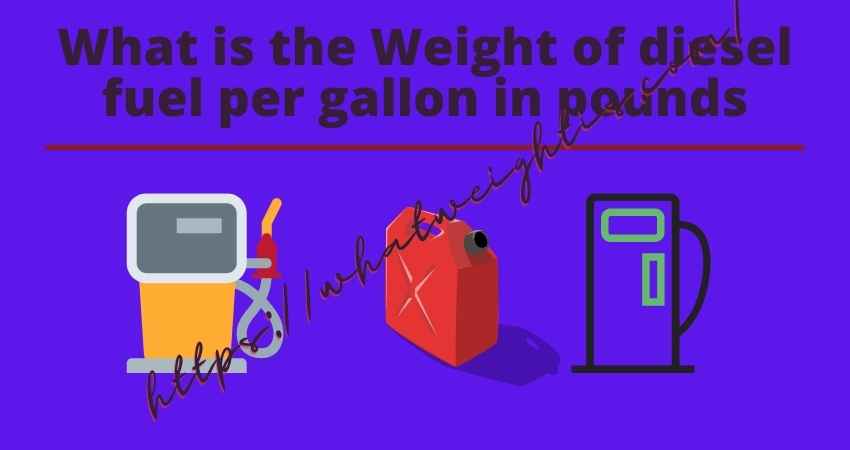When dealing with fuels it can be hard to truly know if you are getting what you are paying for. In this article, we will explore weight of diesel fuel per gallon in pounds. One gallon of diesel that you buy at 16 degrees may weigh 7.1 pounds, but that same gallon at 106 degrees could weigh 6.8 pounds. As stated, diesel expands when it becomes warm, is one gallon of diesel the same as another gallon of diesel? This blog will look at how this happens, why it is important, and how you can use different tools to make sure you are getting what you are paying for.
What is diesel oil?
Diesel is a complex mixture of hydrocarbons. It contains about 6% to 12% of non-hydrocarbon substances, which are largely composed of sulfur and ash. Diesel oil is used in all diesel engines today because it has the proper properties for burning efficiently at high temperatures (500°F ) and pressures (75 psi). The properties of diesel oil are important to keep in mind when comparing the performance of a specific engine against another.

How does diesel oil become heavy?
Diesel fuel contains an extremely high amount of energy per unit volume, which means that it is very dense. When you pour diesel fuel into a tank, it will take up about twice as much space as gasoline or kerosene. This means that if you are comparing the weight of an engine to its size, this is what you should be looking at. Diesel engines use less energy per unit volume than other engines. The density of diesel fuel means that it is more dense than other fuels, so the weight will be higher when compared to other fuels. https://youtu.be/X-eDkWwywTA
A diesel locomotive is a type of train powered by a diesel engine instead of a steam engine. A Weight of diesel locomotive might be the most used heavy haul cargo carrier around the world.
Why we need diesel oil?
Diesel engines operate at higher temperatures than other engines. This means that the oil needs to be able to withstand high temperatures, as well as resist fouling from deposits of carbon or ash particles. The chemical properties of diesel oil also make it a superior lubricant for these high-temperature environments . Diesel oil is also less corrosive than other oils, which makes it an excellent choice for use in these engines.
Diesel Oil vs Gasoline
When comparing diesel fuel to gasoline or kerosene, the performance of a diesel engine should be compared on its own merits. The properties of diesel fuel are what make it superior to other fuels. The performance of a diesel engine should be compared on its own merits, rather than being compared against the properties of gasoline or kerosene.
Diesel Oil vs Gasoline – Performance
The main factor that makes diesel engines so efficient is the high compression ratio. Diesel engines have a much higher compression ratio than gasoline or kerosene engines, which means that they can operate at much higher temperatures without problems. The high-compression ratios of diesel engines also allow them to be more efficient at converting fuel into mechanical energy .
Diesel Oil vs Gasoline – Reliability
Diesel engines have a reputation for being very reliable. They are more durable than gasoline or kerosene engines, and they require less maintenance . Diesel engines also have a higher power-to-weight ratio , which means that they can run faster at lower RPMs . This is a great advantage for racing cars and trucks.
Diesel Oil vs Gasoline – Noise
The noise produced by diesel engines can be considered an asset or a liability, depending on the situation. They are quieter than gasoline or kerosene engines, which means that they can be used in residential areas. However, diesel engines are much noisier than gasoline or kerosene engines. They also produce a distinctive “buzz” that is very noticeable in the ears of people who are near them.
Diesel Oil vs Gasoline – Durability
The durability of diesel engines is similar to that of gasoline or kerosene engines. Diesel fuel has less sulfur and other contaminants than gasoline, which means that it is easier to handle and store. However, diesel engines can be damaged by water , such as from floods or snowstorms .
Diesel Oil vs Gasoline – Fuel Efficiency
Diesel engines are generally more fuel efficient than gasoline or kerosene engines. This is because they have a higher compression ratio, which allows them to run at higher temperatures without problems. They also produce less carbon monoxide and other pollutants , which means that they can be used in areas where they would be prohibited by other means.
Diesel Oil vs Gasoline – Maintenance
Maintenance of diesel engines is much less than that of gasoline or kerosene engines. Diesel fuel does not need to be blended with oil, and it can be stored for long periods without problems. However, diesel engines are more sensitive to water than gasoline or kerosene engines.
Mr. Jahangir Alam is an Electrical & Electronics Engineer with a wide range of experience in several fields of Engineering. He finds engineering articles to be very interesting, and that is why he likes to write them. To know more about him, please click here.

